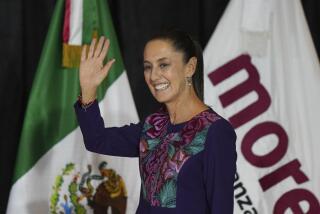Fretting Over Philippines
- Share via
Reagan Administration officials aren’t trying to hide their concerns about what happens in the Philippines after next Friday’s scheduled presidential election. One of the things worrying Washington is that a victory by President Ferdinand E. Marcos over Corazon Aquino would be seen as having been so fraudulently obtainedthat a lot of disheartened moderates might feel compelled to adopt more extremist positions. In that case the real winners of the election would be the insurrectionists of the Communist-led New People’s Army.
The problem for the United States is that while such dire consequences are easy enough to foresee, they are almost impossible to prevent. Officially neutral in the electoral affairs of the Philippines, the United States has had largely to content itself with repeated and strong expressions in behalf of a fair and honest election. Even that innocent enough endorsement of the democratic process has raised a cry of meddling from the Marcos faction.
President Reagan has felt obliged to issue an unusual personal statement citing the importance of the Feb. 7 voting “to the future of democracy” in the Philippines, and holding out the prospect of “significantly larger” economic and military aid if the next government in Manila makes fundamental economic, political and military reforms. All that is contingent, however, on an election outcome that “Filipinos accept as credible.” That seems a reasonable enough standard, but it may also set the stage for a major challenge to U.S. policy.
Aquino’s supporters already assume that if she loses it will be because of outright fraud or more subtle electoral rigging. If they claim that the election wasn’t credible, the United States can’t very well say that it was. If--or more plausibly when--that happens, the United States may find itself with less influence over events in the Philippines than at any time in recent years. It wants to help the Philippines repair an economy ravaged by years of official corruption and mismanagement, and it wants to help Filipinos contain the rising threat to their country’s internal security. But if Marcos stays in office both of these aims seem doomed to failure. Marcos can’t be trusted to clean up the mess that he has made, and the United States risks further damage to its standing with Filipinos by even trying to work with him. The concerns that Washington feels now over next Friday’s voting are likely to increase as soon as the results are announced.
More to Read
Sign up for Essential California
The most important California stories and recommendations in your inbox every morning.
You may occasionally receive promotional content from the Los Angeles Times.













